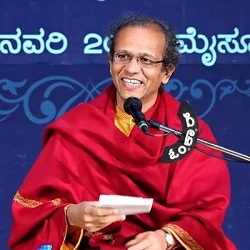
Śatāvadhānī Dr. R Ganesh (b. 1962, Bengaluru) is one of India’s foremost Sanskrit poets and scholars. He writes and lectures extensively on various subjects pertaining to India and Indian cultural heritage. He is a master of the ancient art of Avadhānam, where he faces a group of eight (in Aṣṭāvadhānam) or hundred (in Śatāvadhānam) questioners and in response to their many queries, composes extempore poems set to metre, solves poetic challenges, solves a magic square, keeps track of the count of a randomly rung bell, and so forth. Ganesh performs Avadhānam primarily in Kannada, Sanskrit, and Telugu. (He is credited with reviving the art in Kannada.) He has performed more than 1,200 Aṣṭāvadhānams and five Śatāvadhānams thus far. He is fluent in several languages including Sanskrit, Pali, Prakrit, Kannada, Telugu, Tamil, Hindi, Greek, Latin, and Italian. He is well versed in the Vedas, Vedāṅgas, Upaniṣads, Dharma-śāstra literature, various classical texts on the arts like the Nāṭya-śāstra, and literature in classical Sanskrit. Ganesh holds a bachelor’s degree in Mechanical Engineering and master’s degree in Metallurgy as well as in Sanskrit. Hampi University awarded him a D. Litt. for his thesis, ‘The Art of Avadhānam in Kannada.’ Tumkur University awarded him an honorary doctorate (D. Litt.) He is recipient of several awards and recognitions including the Badarayana-Vyasa Puraskar from the President of India for his contribution to the Sanskrit language.
Abstract of the lecture – Introduction to Indian Poetics
A feel for beauty is inherent in human beings. While everyone experiences the beautiful, only a few set out to analyse it. Indian thinkers have concerned themselves with such analysis from millennia. They have developed a theory that elegantly explains the experience of beauty in all aspects of nature and culture. The fruits of their realisation concerning literature—the acme of culture—are particularly significant.
Our likes and dislikes (rāga and dveṣa) propel our emotions (bhāva) and render them opaque. Caught in their grip, we hardly get to relish emotions in their transparent state. Aesthetic experience (rasa) secures for us this unique delight by kindling dispassion. Implicitly indivisible, it manifests in these primary forms: love (śṛṅgāra), humour (hāsya), pathos (karuṇa), wrath(raudra), heroism (vīra), terror (bhayānaka), disgust (bībhatsa), and wonder (adbhuta). Śānta (loosely tranquillity) is at the heart of all art experience.
Aesthetic experience is an impression; poetic expression cannot capture it. Suggestion (dhvani) is the vehicle that leads connoisseurs to it by assisting them in recreating the emotional picture produced by the poet. Propriety (aucitya) marks the co-ordinates of time and place—i.e.,a suitable context—within which this recreation is enjoyable. It also ensures the poet does not create something distasteful. The poet goes about his business by using words and meanings in a well-turned way (vakra-vidhi), releasing them from the shackles of worldly utility. The rasa-dhvani-aucitya-vakratā quartet is relevant to all arts.
Indian literary theory is mainly codified in Sanskrit. However, it is applicable to all genres of literature evolved in all our regional languages. It is a pan-Indian science that commands worldwide significance. Anchoring itself to universal experience, it steers clear of social, economic, and political theories that change by the day. Transcending religious dicta, it provides insights into art that are experientially verifiable. Its tenets are applicable to the whole gamut of literature – ranging from the classical to folk, from ancient poems to modern novels.
The talks will focus on these aspects of Indian Aesthetics, drawing from the treatises of masters such as Bharata, Ānandavardhana, Abhinavagupta, and Kuntaka. They will present a brief overview of the history of this discipline, enumerate its cardinal principles, and explain its employability in the appreciation of world literature.
Readings
Ganesh, R. 11 September 2017. “Musings on Indian Aesthetics”, Prekṣā: A Journal of Culture and Philosophy.
Warder, A. K. 1978. The Science of Criticism in India (Vol. 7). Adyar Library and Research Centre.
Hiriyanna, M., & Indira Gandhi National Centre for Arts. 1954. Art experience. Kavyalaya Publishers.